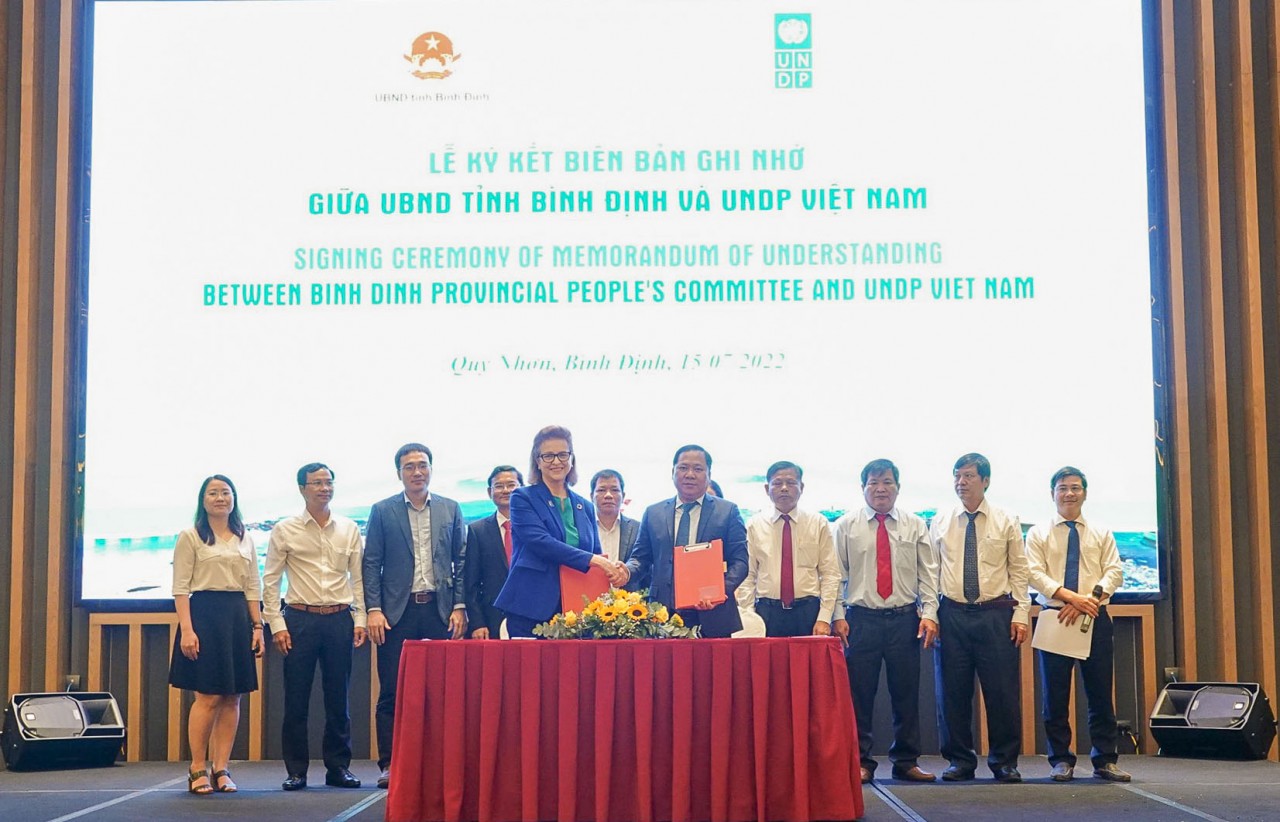
Management solid waste, plastic for the reduction of marine plastic pollution
Latest
 |
| Binh Dinh Provincial People's Committee and UNDP Vietnam also signed a Memorandum of Understanding at workshop on Collective actions to improve solid waste and plastic management in Binh Dinh to reduce marine plastic pollution. |
Participants of the workshop included leaders of Binh Dinh Provincial People's Committee, Quy Nhon City, Vietnam Administration of Seas and Islands (VASI), Department of Natural Resources and Environment, Department of Agriculture and Rural Development, Department of Planning and Investment, Department of Foreign Affairs, Department of Home Affairs, Department of Construction, Department of Health, Binh Dinh Fisheries Association, Binh Dinh Union of Science and Technology Associations, International Centre for Interdisciplinary Science and Education (ICISE), and experts from the Institute for Research and Socio-economic Development Binh Dinh Provincial, Quy Nhon University.
Vietnam is one of the countries that generates a large amount of plastic waste into the ocean. Land-based plastic waste sources are considered the main source of waste and, on a larger scale, sources in the ocean. Specifically, up to 80% of plastic waste comes from the mainland, that is, from production and human activities; the remaining 20% comes from fishing, aquaculture, and vessels during their voyages.
Along with that, the strong development of the tourism industry and the increase in population make the daily amount of untreated waste discharged into the environment higher and higher, causing serious harm to the environment in coastal areas and islands, significantly damaging the seagrass and coral ecosystems in protected areas. Vietnam is facing the problem of resource depletion and waste increase, especially ocean plastic waste.
In Binh Dinh province, the total domestic solid waste (DSW) is about 900 tons/day. The collection rate is about 47-90% in urban areas (Quy Nhon city: 94%); 30% in rural areas. According to data from the UNDP preliminary survey in 2022, 17% of DSW is recycled; Plastic waste accounts for 20% of DSW.
The workshop introduced the contents of two new projects that will be developed and implemented in cooperation with the People's Committee of Quy Nhon City and the Department of Natural Resources and Environment of Binh Dinh province.
These projects will undertake activities aimed at empowering informal waste workers and strengthening their resilience to vulnerabilities. The project will also pilot a waste management model in the fishery sector, in which fishermen are encouraged to bring back their waste to shore after every sea journey.
The joint efforts are expected to collect and avoid around 5 tons of plastic per month from entering the sea. In addition, the project also piloted and established a Material Recovery Facility (MRF) to improve the local material value chain, support the replication and expansion, and ensure the sustainability of the integrated solid waste management models.
Ms. Caitlin Wiesen, UNDP Resident Representative in Viet Nam said, tackling marine plastic is vital to the health of the oceans, people and planet and requires an integrated approach that shifts behaviors to reduce plastic use at source, while engaging all players in the value chain to ensure that plastic that is used gets re-used.
About the Material Resource, Ms. Caitlin Wiesen said, UNDP expects the MRF will be able process up to 2-4 tons of plastic per day for re-use in secondary markets, which would help Quy Nhon City prevent plastic from ending up in land fills or in the ocean. "We will also work with the City of Quy Nhon to accelerate household waste sorting, segregating collection, while introducing innovative alternatives to plastics," said UNDP Resident Representative in Viet Nam.
Phase 1 project "Enhancing management capacity and environment protection awareness of local communities, developing a community-based model of waste collection, classification and treatment in order to minimize plastic waste in coastal wards and communes of Quy Nhon Bay, Binh Dinh Province” is funded by the United Nations Development Program, the Small Grant Program - Global Environment Facility (UNDP/GEF SGP), the Government of Norway and counterpart funds from of the Quy Nhon City People's Committee. The Project has been being implemented from August 2020 to July 2022 in 4 communes/wards of Nhon Ly, Nhon Chau, Nhon Hai and Ghenh Rang.
Within the framework of phase 1, socialization models have been established to improve the solid waste management system in Quy Nhon, including a zero-plastic waste clean tourist beach model in Nhon Ly, a pilot model of making microbiological fertilizer for 50 households with over 60 kg of microbiological fertilizer made, pilot model of "waste sorting at source" in Nhon Chau with the participation of 518 households. 04 restaurants in Nhon Ly, Nhon Hai have participated in the "Friendly restaurants that do not use single-use plastic" model. One hundred ninety-five households participated in the residential-based model of collecting, sorting, recycling, and reusing waste. The "Female workers in the waste sector" model has also been established.
At the workshop, Binh Dinh Provincial People's Committee and UNDP Vietnam also signed a Memorandum of Understanding (MoU) to promote cooperation between the two parties in the fields of circular economy and waste management; sustainable development of ocean economy; climate change and biodiversity; mine action and sustainable rural development.

















